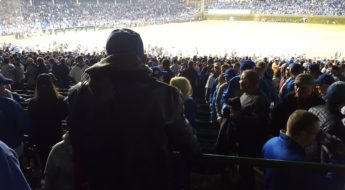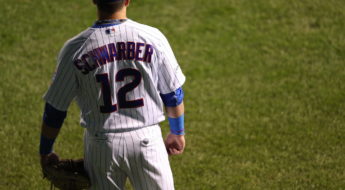Details Of An Extraordinary Game 7 May Fade, But The Emotions Will Forever Linger
By Matt Spiegel–
(CBS) That was the craziest sporting event I’ve ever attended.
It may have been the greatest Game 7 in World Series history.
It surely was the most anticipated baseball game in decades, and it lived up to every bit of the hype.
There are myriad schematic machinations to be broken down regarding the Cubs’ thrilling 8-7 win in 10 innings against the Indians on Wednesday night. Dozens of key plays demand scrutiny, bizarre managerial mistakes beg explanation and moments of personal redemption deserve due. But details will eventually fade. In a few years, we’ll have to look them up as evidence to back up what we’ll always remember.
It’s the volatile emotional swings this 2016 clincher provided that will stick. The game was alternately thrilling and painful, shifting between premature parade planning and the seeming certainty of encroaching doom. It was exactly what a 108-year drought-ender had to be, a classic microcosm of a century’s struggle.
“It felt like we played a whole season in one game,” Cubs outfielder Dexter Fowler said afterward.
Tell me about it. So much got twisted from the first inning to the 10th that Fowler’s lead-off home run feels like it happened in August.
I’ve always been convinced that the baseball gods are giggling sadists. This night devolved from a three-run eighth-inning lead into absolute torture. Even when the game rewards you, it usually hurts along the way.
How dark did you get?
When Aroldis Chapman came in from the bullpen in the eighth inning, the dread hit me. From the moment his acquisition was just a rumor, I wanted no part of him. I woke up that morning on July 25 hoping the trade would fall apart and discussed it on air all week.
Chapman’s appearances have always stressed me out and produced uncomfortable feelings — and not just because of moralism regarding his off-the-field issues. I find him incredibly frustrating as a pitcher. His fastball can be very straight, and if it drops a tick from the devastating 101 mph and above, he’s beatable. His trust in his slider is inconsistent. And as the months went on, it became apparent that his situational comfort zone was extremely narrow. A clean ninth inning seemed to be the one time he’d shine.
So when the only real unlikable player on this great Cubs team blew the lead via a Rajai Davis home run, bitter fear had already been flowing.
I got angry at Chapman. I got angry at the front office, who I’d felt had sold their soul just a bit in order to get him. I got angry at manager Joe Maddon, whose unnecessary misuse of Chapman in Game 6 had clearly weakened him. I stayed angry at Maddon, reflecting on the horrific early hook for Kyle Hendricks and the insertion of Jon Lester and David Ross mid-inning with a runner on base. I stayed angry at Maddon some more, thinking that Lester could have gotten out of the eighth inning himself and allowed Chapman his precious clean ninth.
The brilliant Zen philosopher baseball manager let the pressure exceed the pleasure several times in these last three games. He seemed to stick with a theoretical plan of using the players he thought he was supposed to use and stopped reading the situations. He pulled starters too early, put relievers in dangerous spots and overused his strikeout closer. The fact that Maddon got away with it and won a World Series avoided massive damage to his legacy.
In the midst of the darkness, rain came and everything paused. The vibes reset. We found out later that the Cubs had an emotional players’ meeting in the weight room, with Jason Heyward leading an impassioned discussion about refusing to quit. Chapman apparently was in tears, feeling the weight of his Maddon-assisted failure. The Cubs emerged from the 17-minute break rejuvenated and frisky.
Soon, I felt the same. A two-run 10th inning rally was beautiful, with Ben Zobrist’s heroics cementing his opportunity to be a car dealer and/or restaurateur in this town for decades. Carl Edwards Jr. came in to close the game; I felt giddy and confident. Chapman wouldn’t be on the mound for a highlight we’ll see for a century to come.
Edwards faltered, and Mike Montgomery entered with a one-run lead. I still somehow felt giddy and confident. It was time.
And then there it was, the final out. Next came the on-field celebration, a phone-buzzing onslaught of congratulatory texts and the sudden realization that we live in a brave, new world.
The “lovable losers” tag is officially history. The goat mythology is reduced to an incredulous story for your grandkids to doubt. No more late-night talk show hosts will go to the punchline well and ladle out lazy Cubs shots.
These Chicago Cubs are built to contend for a good long while. “Wait ‘til next year” no longer reads like wistful hope; it’s become a foreboding threat.
Yes, there are some details I’ll remember. Corey Kluber’s repeated short rest caught up to him; he struck out no one in his four-plus innings for the first time all year. Indians manager Terry Francona, who owned this postseason with progressive bullpen creativity, waited one batter too long to go to ace reliever Andrew Miller, who himself was beaten up for the first time in a month. David Ross committed an error and couldn’t stop a wild pitch that scored two runs, only to make up for it with a home run in his final game. Javier Baez made two sloppy errors, then provided his own home run redeemer.
But the exhausting, temperamental emotional test that fans were forced to pass is what will linger. The giggling sadist baseball gods demanded one more pound of flesh from Cubs nation. And you had no choice but to give it up.
This time, however, the story didn’t end there. The heavens opened, and showers cleaned the slate.
Theo Epstein’s 2016 Cubs are designed as beautifully as his 2004 Red Sox were. This team was too good, too complete and too mentally strong to fall down and simply not get up.
On Wednesday night, the Cubs changed the sports world for good.
Wrigley Field is no longer just an incredibly pleasant summer-long diversion.
It is the home of the world champion Chicago Cubs.
Say it loud, as much as you need to, until it feels as real as it should.
Matt Spiegel is a host on the Spiegel and Goff Show on 670 The Score from 9 a.m.-1 p.m. on weekdays. Follow him on Twitter @MattSpiegel670.




